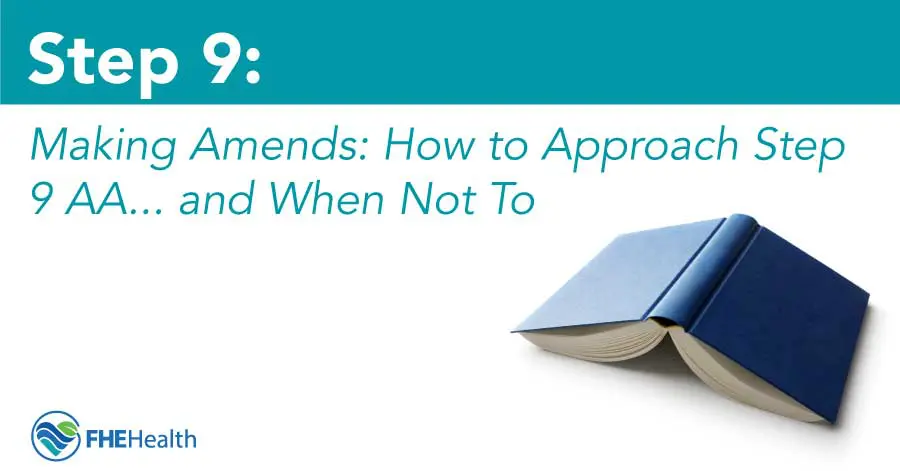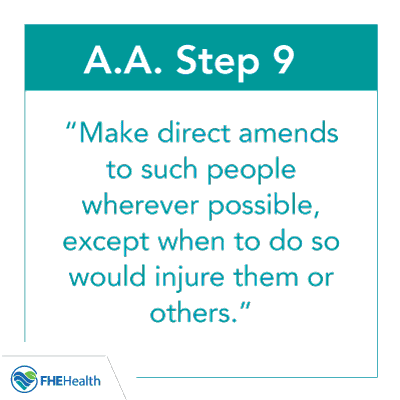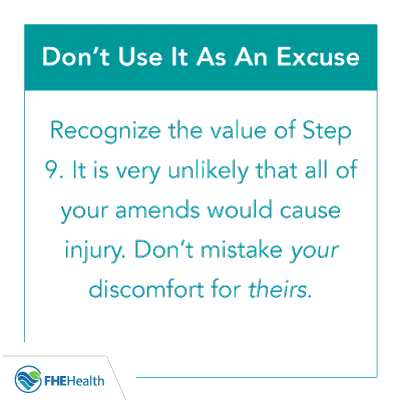

A 12-step program is designed to encourage long-term sobriety, by fostering a spirituality for recovery. Each step signifies a new challenge to reflect and/or act in a way that changes old mindsets and behaviors that once fed addiction. Through mutual support groups like Alcoholics Anonymous, members learn and practice these spiritual steps and principles, with a view to staying sober and helping others do the same.
Of all the 12 steps, Step 9 is often referred to as particularly challenging. Understanding why will require taking a closer look at what Step 9 is, its goals, and its possible outcomes. We’ll also include a Step 9 amends letter for anyone who wants to implement this step but isn’t sure how to.

According to AA.org, Step 9 of the program is to “Make direct amends to such people wherever possible, except when to do so would injure them or others.” This step can be incredibly difficult for those who may be struggling with feelings of shame, pride, or entitlement.
But, as difficult as it is, completing this step can provide an immense sense of relief and newfound hope for the future. At the heart of this step is the need for forgiveness and restoration—forgiving yourself, forgiving others, and making amends. The ninth step is essential in the recovery journey.
After acknowledging how actions tied to their addictions had a negative impact on people in their lives, those in 12-step recovery programs commit to making direct amends whenever possible.
For many who lived in addiction, apologizing was a regular habit. Whether it was apologizing for being late for work, missing an event, misusing property or stealing money to support an addiction, expressing remorse was likely a daily occurrence. The guilt may have been real, but the apology didn’t come with lasting change.
Making amends requires the individual to correct their mistake. This action can demonstrate the person’s new way of life in recovery. It goes beyond simply apologizing to taking steps to right a wrong. Whenever possible, those in recovery are encouraged to make direct amends face-to-face with those they’d harmed while living in addiction.
For example, someone living with an addiction may make amends by apologizing for stealing property and then make it right by returning what they’d taken.
Along with reinforcing new behaviors and outlooks, making amends can also reduce stress. Many who lived with addiction have past behaviors they’re not proud of. By proactively correcting previous mistakes, those in recovery may be able to prevent future conflicts that could trigger a relapse.
Before approaching Step 9, you need to complete the inventory in Step 8. This is a list of all of the people in your life whom you believe you have harmed. It can be a challenging list to write, even for those who want to embrace forgiveness and inner peace—but the list is important. It represents many of the feelings and struggles you’ve had. By working through the list in Step 9 and making amends to each person named there, you will restore a piece of yourself with each conversation.
Willingness to make amends, though, is also a necessary precursor to carrying out Step 9. Hopefully, this willingness will have emerged in the process of completing Step 8 (when you wrote down the names of all the people you hurt). That said, if you’re not feeling up for making amends quite yet, consider revisiting the guidance of Step 8: “If we haven’t the will” to make amends to those we’ve harmed, “we ask until it comes.” Not everyone is immediately ready to make amends. The way to get ready is to ask and keep asking one’s Higher Power for a willingness to make amends—and then wait until that willingness comes.
The goal in making amends is “to freely admit the damage we’ve done and make our apologies,” according to The Big Book. In some cases, making amends may mean paying or promising to pay “whatever obligations, financial or otherwise, we owe,” the Big Book also states.
Say, for example, you’re preparing to make amends to a former coworker, whom you once stole from to pay for drugs. In addition to apologizing and asking for their forgiveness regarding the incident in question, you might offer to repay them in full for the money you stole.
The spiritual purpose of making amends is to find inner peace, freedom, release, and rebirth. While this step involves a direct exchange with another person, its goal has everything to do with healing and addiction recovery on the part of the person making the amends.
One of the most important words within Step 9 is the word “direct.” In some programs, you’re encouraged to forgive others or to work through the guilt and shame you feel towards others on your own, without the involvement of the other party. Yet, to be truly successful at forgiving and releasing past wrongs, you need to go directly to the individual you’ve hurt. When you go directly to the person, real spiritual transformation is more likely to occur.
You also face the problem head-on. That is, you can’t push it to the side or avoid it because of embarrassment. The problem is there, and that person is in front of you right now. You cannot (and should not) avoid the pain.
There are three main types of amends, and it’s important to recognize which one is appropriate in a given situation. Understanding some making amends examples can help the individual correct past behaviors.
Direct amends refers to going directly to the wronged individual, apologizing and taking whatever action is necessary to correct a situation. If an individual damaged someone else’s home while they were under the influence of drugs or alcohol, direct amends may require that they go to the property owner, apologize and repair damages. Those in recovery are encouraged to make direct amends whenever possible.
Direct amends are not always possible or practical, but that doesn’t mean the individual is unable to demonstrate changed behavior. Indirect amends may be a better course of action if the harmed person isn’t willing or able to see the individual in recovery or if they didn’t know they were harmed and discussing the incident could be damaging for them. Volunteering for a worthwhile cause or supporting a charity can be a valuable way to make amends.
Living amends is a third option for those in the ninth step of recovery. With this option, the individual in recovery takes steps to improve their relationships and demonstrate their lifestyle change. They may visit family members and friends more often, set aside time to spend with their partner or donate their time to a worthy cause.
Sometimes it can be hard to know what to say when preparing to make amends. There may be so many times we feel we let someone down that it can be hard to know where to begin. We want to convey our heartfelt remorse but worry that our words will fall short.
Consider writing a letter to the person you’re making amends to—and then share it with them, by reading it to them aloud. Here are some initial guidelines for writing your letter:
Be specific and avoid global statements of guilt. It can be tempting to say things like “I’m sorry for everything I’ve done to you,” but try to avoid these blanket statements. They miss the opportunity to be truly reflective about how your wrongdoings have impacted the other person and can be misread. The other person may hear the same statement as exasperation with them or a minimizing of the ways you’ve hurt them. Instead, try to reference specific times when you hurt the other person and/or let them down. Being specific also makes the amends that you offer more achievable. You may not be able to rectify “everything” you’ve done to the other person, but you can repair specific wrongs.
State how you are taking personal responsibility for the hurt you’ve caused. Making amends means apologizing but also goes one step further—doing everything in your power to repair the damage, restore the relationship, and/or, replace what you took. If you’re writing a letter, whether sending or sharing it in person, spend some time reflecting on and sharing the actions you’re taking to redress the wrong(s) done.
Examples of making amends abound. Here is a sample letter, circulated by AA members, from a father to his daughter. Let’s return for a moment to the former coworker whom you hypothetically stole from (above) to get money for drugs. If they are willing to meet with you, you might want to write the following letter in advance (which you can share with them in person):
I am very sorry for stealing money out of your desk in order to fund my drug habit last year. I let you down and destroyed our friendship. Remembering how I stole from you makes me sad and fills me with shame. While I did these things in active addiction, that does not take away from how wrong they were, and the pain and sense of betrayal you must have felt as a result of my actions.
To the best of my abilities, I have calculated the total amount of money that I stole from you so that I can pay you back. Here is $200, and if I’m incorrect and owe you more, I will repay the remainder.
I cannot go back and change the past, but I can take responsibility for my actions. I am now in recovery and working a 12-step program. Each day I ask my Higher Power for the strength to help me stay sober and live responsibly and with honesty. I hope you can find it in your heart to forgive me, but if not, I understand.

There are many situations in which individuals taking this step will encounter receptive, willing individuals. These are often the people you feel you hurt or let down the most. They listen to you; they want to work with you. They’re also willing to accept the amends you make and work to rebuild your relationship. In some cases, this rebuilding takes time, but they don’t push you away or tell you “no.”
One important component of Step 9 is avoiding making amends to people who could suffer in the process. Making this determination can be difficult. Some people in the recovery process only naturally want to say sorry—whatever the pain or hurt they caused. But, there are times when it’s best not to make amends:
To discern whether to make amends, ask yourself why you’re wanting to contact the person. For example, if you had an affair for three years during active addiction, visiting your ex to fess up and say you’re sorry isn’t going to help them; it’s going to hurt them. Are you taking the step to clear your conscience at the expense of another person? If so, then you should avoid approaching that individual.
On the opposite side of the street are those individuals who simply say, “All of my amends would hurt people. I’m just not going to speak to anyone.” Avoid the temptation to get out of this step. Rather, recognize the value of Step 9 for yourself.
When you make amends, you’re taking a step towards resolving a problem so it doesn’t come back to hurt you later. If you don’t make amends, the issue could arise down the road and trigger a relapse. Amends help you avoid these situations for good.
If you’re on the fence about Step 9, remember that making amends can help you and the other person. They, too, can experience healing in the exchange.
When you make amends, the way you look and feel about situations changes. You can gain clarity about what happened and what should have happened. You also gain some relief from the guilt you feel. Letting go of that guilt can be very healing.
Some of these same things can happen to the other person in the process. They may find resolution and understanding about the past. They may discover they can forgive, too. Or, they may gain greater insights about addiction and commit to being a more supportive person in your recovery.
It would be nice if the above outcomes were universal—but they aren’t (of course). Making amends won’t necessarily play out like the ending of a Hallmark movie. Sometimes, the outcome can be uglier and downright disappointing. The other party may be non-receptive, for example. They may refuse to meet at all or refuse to listen to what you have to say.
Even so, you will have done all that you can to take responsibility for the past—and there’s a level of peace and freedom in that as well. How the other person chooses to respond to our amends is out of our control. You, at least, have done your best and can now move on. Completing Step 9 is the next step forward in recovery, regardless of how the other person responds.
It’s not possible to forget what happened. But, by facing reality and the long-term impact of your actions, and making amends to those you’ve hurt, you’re able to make peace with the past and put it behind you and move forward.
One very effective way to make amends is to go to treatment. At FHE Health, you’ll learn more about Step 9 and how to handle the worst of experiences. For many, this is one of the most important components of recovery, because it allows them to work on rebuilding their relationships and letting go of those they cannot repair. Our team works closely with you throughout this process to help you achieve your goals in recovery.
Our 12-Step Series:
Kristina Robb-Dover is a content manager and writer with extensive editing and writing experience. read more